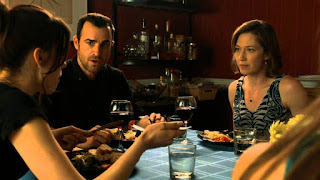The Left Behind
"they're giving them something. I mean, we can strip it away, but once it's gone? We have nothing to put back in its place." — Tom, "The Leftovers"
Few shows were as polarizing as "The Leftovers." Based on a fascinating, but difficult, book by Tom Perrotta, the show developed by Perrotta and Damon Lindelof was a fascinating meditation on grief and loss. It was dark, difficult and, at times, confusing. The first season wasn't a show I loved, but it was a show I was drawn to watching.
The second season has been something else. It's been more compelling. It's been more rich. But it's continued that tough, dark look at grief and loss. When the show aired its second season finale on Sunday, I thought it had done something beautiful. It had found hope in sadness, a way forward in the darkness.
I don't know if it's just the tough cultural times we live in, but it can feel like danger, loss, and sadness are all around us. It seems natural that we would look for answers, but more than that we'd look for an escape.
This second season focused on the town of Jardin, Texas, a town where no one disappeared during the event that saw 2 million people vanish in the blink of an eye. The park around it was called Miracle, and the world saw the town as set apart. But they weren't. They weren't special or magical, they were just people.
The beauty in the season was seeing that even a place where people hadn't disappeared was touched by grief, confusion, and loss. As Michael Murphy (Jovan Adepo) boldly declared in the finale, the people of Jardin were not sparred. They weren't sparred suffering, heartache, and loss. They were just blocked from embracing that reality.
That was the case with Meg (Liv Tyler), too. Her mother died the day before the departure. She was trapped in private grief, while others were engaged in public mourning. It left her feeling even more broken and isolated. I remember hearing the same thing about those who lost loved ones on September 10 or even September 11, 2001. Those that didn't perish in the attacks got somewhat lost in the shuffle of a shared national grief.
Or what about those who experienced the birth of a child on September 11, 2001. They experienced the joy of their life while the nation grieved, mourned, and was trapped in a paralyzing fear. That is the kind of emotional depth that "The Leftovers" sought to explore, and in doing so created a rich, emotional, and thought-provoking tapestry.
It's not an easy show to watch, and it's often not that fun, but it's beautiful in the way it's done. There was a richness to the narrative in the final episode, and the hope it offered in finding a way through that grief.




Comments
Post a Comment